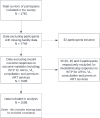Willingness to pay for antiretroviral therapy, viral load, and premium services; A contingent valuation survey of people living with HIV in southern Nigeria
- PMID: 37972145
- PMCID: PMC10653503
- DOI: 10.1371/journal.pone.0289507
Willingness to pay for antiretroviral therapy, viral load, and premium services; A contingent valuation survey of people living with HIV in southern Nigeria
Abstract
Background: With stagnating funding for HIV and AIDS control programs in Nigeria, alternative funding models for antiretroviral therapy (ART) including out of pocket payment are being considered to sustain momentum epidemic control targets. We assessed willingness to pay for ART related services, and factors associated with willingness to pay.
Methods: Between July and August 2019, we conducted a survey among people living with HIV (PLHIV) on ART in 3 states in southern Nigeria. Randomly sampled respondents on ART for at least 6 months, aged ≥ 18 years, able to communicate in English or pidgin English, and consenting to the survey were enrolled. Respondents were asked if they were willing to pay for clinical consultation, antiretroviral drugs (ARVs), viral load testing services and premium ART services (including fast track services). Respondents indicating willingness to pay for any of these services were asked the maximum amount they were willing to pay using contingent valuation methodology. We assessed the weighted proportions of PLHIV on ART willing to pay for ART and used survey-featured logistic regression measures to assess sociodemographic and ART related factors associated with willingness to pay for ART services.
Results: Overall, 1,598 PLHIV with a mean age of 39.03 years (standard deviation [SD]: 11.23 years), were included in this analysis. Of these, 65.8% (1,079), 73.9% (1,192), 61.0% (995) and 33.6% (472) were willing to pay for ART consultation, ARVs, viral load testing services and premium ART services respectively. The median maximum amount PLHIV were willing to pay for clinical consultation and for ARVs was NGN1,000 (USD equivalent of $2.78; interquartile range [IQR]: 500-2,000) respectively, and NGN2,500 (USD equivalent of $6.94; IQR: NGN1,000-5,000) and NGN2,000 (USD equivalent of $5.56; IQR: NGN1,000-3,000) for viral load testing and premium ART services respectively. Receiving ART in Lagos state, being employed and having a monthly income of NGN100,000 or more was associated with willingness to pay for the various ART services.
Conclusion: We found generally high-level of willingness to pay for ART consultation, ARVs and viral load testing services but low willingness to pay for premium ART services among PLHIV on ART. The maximum amount PLHIV were willing to pay for various ART services fell short of benchmarks for alternative funding but can potentially supplement ART by funding differentiated service delivery models that require nominal amounts to facilitate person-centered differentiated service delivery models.
Copyright: This is an open access article, free of all copyright, and may be freely reproduced, distributed, transmitted, modified, built upon, or otherwise used by anyone for any lawful purpose. The work is made available under the Creative Commons CC0 public domain dedication.
Conflict of interest statement
The authors have declared that no competing interests exist.
Figures



Similar articles
-
Willingness to pay for antiretroviral drugs among HIV and AIDS clients in south-east Nigeria.Health Expect. 2018 Feb;21(1):270-278. doi: 10.1111/hex.12612. Epub 2017 Aug 14. Health Expect. 2018. PMID: 28805985 Free PMC article.
-
Co-financing for viral load monitoring during the course of antiretroviral therapy among patients with HIV/AIDS in Vietnam: A contingent valuation survey.PLoS One. 2017 Feb 15;12(2):e0172050. doi: 10.1371/journal.pone.0172050. eCollection 2017. PLoS One. 2017. PMID: 28199405 Free PMC article.
-
Financial mobilization for antiretroviral therapy program: multi-level predictors of willingness to pay among patients with HIV/AIDS in Vietnam.AIDS Care. 2018 Dec;30(12):1488-1497. doi: 10.1080/09540121.2018.1503633. Epub 2018 Jul 26. AIDS Care. 2018. PMID: 30047280
-
Economic and modeling evidence for tuberculosis preventive therapy among people living with HIV: A systematic review and meta-analysis.PLoS Med. 2021 Sep 14;18(9):e1003712. doi: 10.1371/journal.pmed.1003712. eCollection 2021 Sep. PLoS Med. 2021. PMID: 34520463 Free PMC article.
-
Viral load monitoring for people living with HIV in the era of test and treat: progress made and challenges ahead - a systematic review.BMC Public Health. 2022 Jun 16;22(1):1203. doi: 10.1186/s12889-022-13504-2. BMC Public Health. 2022. PMID: 35710413 Free PMC article.
References
-
- United Nations Joint Programme on HIV/AIDS (UNAIDS). Country factsheets: Nigeria 2020 HIV and AIDS estimates [Internet]. 2020 [cited 2022 Jun 19]. Available from: https://www.unaids.org/en/regionscountries/countries/nigeria
-
- United Nations Joint Programme on HIV/AIDS (UNAIDS). Country Progress Report—Nigeria [Internet]. Geneva, Switzerland; 2020. Available from: https://www.unaids.org/sites/default/files/country/documents/NGA_2020_co...
-
- United Nations Joint Programme on HIV/AIDS (UNAIDS). Prevailing Against Pandemics by putting people at the centre [Internet]. Geneva, Switzerland; 2020. Available from: https://aidstargets2025.unaids.org/
-
- Oladele TT, Olakunde BO, Oladele EA, Ogbuoji O, Yamey G. The impact of COVID-19 on HIV financing in Nigeria: a call for proactive measures. BMJ Glob Heal [Internet]. 2020. May 19;5(5):e002718. Available from: https://gh.bmj.com/lookup/doi/10.1136/bmjgh-2020-002718 - DOI - PMC - PubMed
MeSH terms
Substances
LinkOut - more resources
Full Text Sources
Medical

